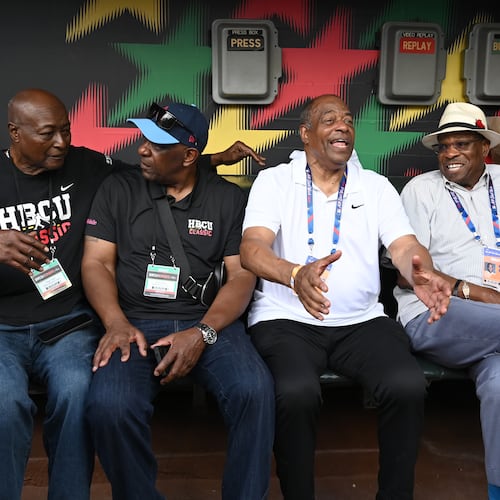DALLAS -- With memories of the Braves’ September collapse still lingering, and the Marlins scooping up expensive free agents, and other NL East teams making moves, Frank Wren knows Atlanta fans want to see him wheel and deal.
But the Braves general manager leaned back in a chair in his suite at the Hilton Anatole on Monday, the first day of baseball’s annual Winter Meetings, and said he would only make a trade if and when the Braves think it’s to their benefit.
“You can get caught in that trap and get intoxicated by the deal,” he said. “There’s an adrenaline rush to making a deal, but the bottom line is, does it make us better? We’re not going to make a deal just to make a splash at home. We’re not going to make a deal just to make a deal. We’re looking to get better.”
Wren said the top-priority need is a backup shortstop. The Braves want a proven veteran who can be ready to step in if rookie shortstop Tyler Pastornicky struggles. They want a player like versatile Jamey Carroll, for whom the Braves showed interest before the free agent signed a two-year, $6.75 million deal with Minnesota.
The Braves don’t want to commit more than a year to a shortstop because they have Pastornicky, and shortstop prospect Andrelton Simmons not far behind him.
Next on the priority list is the outfield. Teams that have spoken with the Braves about possibly trading for Atlanta’s Martin Prado say the Braves are reluctant to trade the left fielder and backup third baseman unless they get a power-hitting outfielder in return.
“The one definitive need we have is a backup shortstop,” Wren said. “I mean, if you ask me, is there something we have to have going into spring training.”
Wren seemed to downplay that need a bit, noting that the Braves signed Drew Sutton and Josh Wilson, minor league free-agent infielders with major league experience.
“Both of them are better than a lot of guys that will be in big league camps, so we don’t feel like we have to have anybody,” Wren said. “But if there’s a guy out there that improves us, that’d probably be our target.”
The Braves’ outfield has been one of the least productive in the majors the past two seasons, but the team believes right fielder Jason Heyward will bounce back from a disappointing second season and Prado’s second-half struggles were a byproduct of five weeks he missed battling a lower-leg staph infection.
The Braves acquired leadoff-hitting center fielder Michael Bourn before the July 31 trade deadline and have him under contract for next season before he’s eligible for free agency.
If they move Prado, the Braves would have to replace him in left field and also make sure they have a suitable third baseman to fill in for Chipper Jones, who will be 40 in April.
“[Outfield] is on a wish list, if we could improve,” Wren said. “It’s just that those guys, there aren’t many of them out there that fit kind of the niche we have.”
The available ones are generally overpriced free agents. The Braves, as has been there practice in the past, prefer to fill needs through trades whenever possible.
The team wasn’t mentioned in any compelling trade rumors Monday.
The Marlins signed shortstop Jose Reyes to a six-year, $106 million contract and introduced their new closer Heath Bell (three years, $27 million) at the Winter Meetings. The Marlins also say they’re making a push to sign the most coveted free agent, Cardinals slugger Albert Pujols, though some question whether they’d raise payroll to that extreme.
“I think it’s been pretty apparent since the offseason began that they were going to be very aggressive and go out and try to improve their club,” Wren said of the Marlins, who are moving into a new ballpark. “I think that’s always the goal for teams moving into a new facility. They want to make a splash right away, because sometimes you only have one chance to make a first impression.”
The Braves don’t feel any sense of urgency.
“It’s proven out in recent history, these meetings aren’t the end-all,” Wren said. “Historically this is where a lot of free agents make their decisions, which kind of opens up the floodgates for a lot of other things to happen. But we’ve seen a lot of things happen in January [in past years] in putting your team together.”
About the Author
Keep Reading
The Latest
Featured

